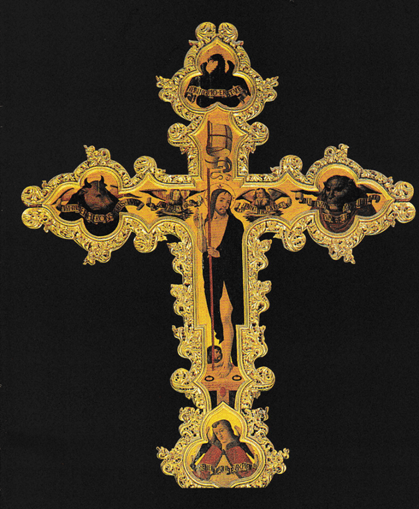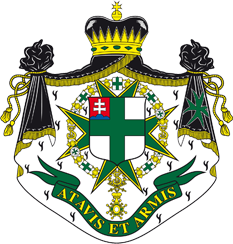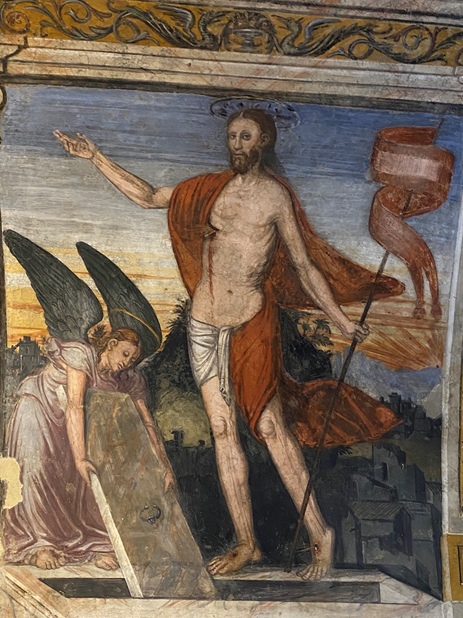Veľkonočné posolstvo 2022 cirkevného Veľkopriora Vojenského a špitálskeho rádu sv. Lazara Jeruzalemského .
MESSAGGIO DI PASQUA 2022 DEL GRAN PRIORE ECCLESIASTICO DELL’ORDINE MILITARE E OSPEDALIERO DI SAN LAZZARO DI GERUSALEMME
(Cristo Risorto – affresco XIV sec. – Cripta della Chiesa di Maria Santissima Assunta di Castelbuono – Palermo)
Carissimi Confratelli e Consorelle dell’Ordine Militare di San Lazzaro di Gerusalemme,
La Pasqua di quest’anno porta con sé tante speranze insieme a tante incertezze e sofferenze. Per sentirci tutti fratelli siamo chiamati ad essere portatori di speranza e operatori di pace, a stare vicini alle sofferenze dei malati e delle vittime di tutte le guerre, ad aprirci alla solidarietà e all’accoglienza nei confronti dei profughi Ucraini e di tutte le persone costrette a lasciare la loro patria a causa di guerre, persecuzioni e calamità naturali.
Siamo chiamati ad essere «Pellegrini di speranza». La differenza fra un pellegrino e un vagabondo sta nel fatto che il pellegrino, anche attraverso un cammino contorto non esente di dubbi, smarrimenti ed esitazioni, è mosso dalla speranza di arrivare ad una meta che dia senso alla sua vita; mentre il vagabondo è uno che vaga senza sapere dove andare, ubriacato dalle fuggevoli mode del tempo. Il pellegrino non è un camminatore solitario, ma uno che si mette in cammino insieme ad altri verso una meta comune.
La speranza si distingue dall’ottimismo, che è un atteggiamento acritico, una convinzione infondata che, non ostante la tragicità della realtà, alla fine tutto andrà bene. Nonostante il momento drammatico che stiamo attraversando noi cristiani siamo chiamati a “«sperare contro ogni speranza» (Rm 4,18) come scrive san Paolo ai Romani. Questa speranza non è solo per i vivi ma anche per coloro che sono morti. Lo stesso Paolo ha scritto: “«Se non vi è risurrezione dei morti, neanche Cristo è risorto! Ma se Cristo non è risorto, vuota allora è la nostra predicazione vuota anche la vostra fede» (1Cor 15, 13-14). Commentando questo testo il teologo evangelico Dietrich Bonoeffer scrive: “«… se Cristo non è risorto, il punto d’appoggio che regge tutta la nostra vita vacilla e tutto si infrange; la nostra vita declina verso il non senso. Ogni discorso che ha per oggetto Dio è illusorio, ogni speranza evanescente». Si dice abitualmente che “«se c’è vita, c’è speranza». In realtà è il contrario: «È la speranza che tiene in piedi la vita, che la protegge, la custodisce e la fa crescere».
La dinamica della speranza cristiana si sviluppa a partire dal riconoscimento della presenza di Gesù Cristo che si fa nostro compagno di viaggio. La scena dei discepoli di Emmaus, narrata nel Vangelo di Luca (Lc.24,13-35) è un messaggio di speranza, che ci indica il metodo educativo di Gesù Maestro, che cammina lungo la strada da Gerusalemme ad Emmaus assieme ai due discepoli amareggiati che si stanno allontanando dalla comunità; non li abbandona nel momento del dubbio e della delusione e accetta di passare da straniero. Da vero Maestro, si mette con discrezione in ascolto, lascia che emergano tutti i loro dubbi e le loro domande. L’anonimo viandante non si limita ad accompagnare i due discepoli: li stimola, li ammonisce con amore e schiude loro il senso delle Scritture per aprire la loro mente ottusa e il loro cuore inquieto allo stupore della novità inaspettata che Dio opera nella storia realizzando le sue promesse. I due discepoli, carichi di tristi pensieri non immaginano che quello sconosciuto sia proprio il loro Maestro, ormai risorto. Mentre Egli parla con loro sperimentano tuttavia un intimo «ardore», che scioglie la durezza del loro cuore. Tra le ombre del giorno in declino e l’oscurità che incombe nell’animo dei due discepoli, quello strano pellegrino è un raggio di luce che apre i loro animi al desiderio della luce piena. Gesù schiude ai due discepoli un nuovo futuro, aprendo il loro cuore a una speranza affidabile. Il misterioso ospite rimane con loro e durante la cena nel momento in cui spezza il pane e lo dona ai discepoli si aprono loro gli occhi e lo riconoscono, ma egli scompare dai loro sguardi. Quando l’incontro diventa pieno, alla luce della Parola subentra quella che scaturisce dal «Pane di vita», con cui Cristo mantiene la sua promessa di rimanere con i discepoli «tutti i giorni fino alla fine del mondo» (cfr. Mt 28,20). I due discepoli, che da vagabondi ritornano ad essere pellegrini pieni di coraggio e di entusiasmo, tornano sui propri passi verso Gerusalemme a testimoniare agli altri discepoli da cui si erano allontanati l’esperienza gioiosa del loro incontro con il Risorto.
Anche oggi Gesù è pronto ad andare anche con coloro che si stanno allontanando dal Cenacolo e dalla comunione dei fratelli. Da risorto non smette di essere il Pastore buono che va in cerca delle pecore smarrite. Sulla strada dei nostri interrogativi e delle nostre inquietudini, talvolta delle nostre delusioni, Gesù, il divino Viandante, continua a farsi compagno del nostro incerto cammino per aiutarci a comprendere il senso della sacra Scrittura, svelarci il significato della sofferenza e della morte alla luce del Mistero Pasquale. Il racconto dei discepoli di Emmaus assicura tutti noi che, quando ascoltiamo la Scrittura e partecipiamo allo spezzare del pane nella Cena del Signore, ci riconosciamo come comunità riunita nel suo nome e ritroviamo fede, speranza e carità per essere discepoli missionari, testimoni gioiosi di Gesù Cristo Risorto.
Auguro che la luce di Gesù Cristo Risorto illumini la vita di ogni Confratello e Consorella e dei loro familiari, ci rinnovi nello Spirito e porti la speranza di un futuro di libertà, giustizia e pace al mondo intero.
+ Michele Pennisi, GCLJ
Arcivescovo di Monreale
Gran Priore Ecclesiastico dell’Ordine Militare e Ospedaliero di San Lazzaro di Gerusalemme
EASTER MESSAGE 2022 OF THE ECCLESIASTICAL GRAND PRIOR OF THE MILITARY AND HOSPITALLER ORDER OF SAINT LAZARUS OF JERUSALEM

(Risen Christ, Pietro Ruzzolone, 1484, Dome of Termini Imerese, Palermo)
Dear Brothers and Sisters of the Military Order of St Lazarus of Jerusalem,
This year’s Easter brings with it many hopes together with many uncertainties and sufferings. In order to feel that we are all brothers, we are called to be bearers of hope and peacemakers, to be close to the suffering of the sick and the victims of all wars, to be open to solidarity and to welcome Ukrainian refugees and all those forced to leave their homeland because of wars, persecution and natural disasters.
We are called to be „Pilgrims of hope“. The difference between a pilgrim and a vagabond is that the pilgrim, even through a convoluted path not free of doubts, bewilderment and hesitation, is moved by the hope of arriving at a goal that gives meaning to his life; whereas the vagabond is someone who wanders without knowing where to go, drunk on the fleeting fashions of the time. The pilgrim is not a solitary walker, but one who sets out with others towards a common goal.
Hope differs from optimism, which is an uncritical attitude, an unfounded conviction that, despite the tragic nature of reality, everything will turn out well in the end. Despite the dramatic moment we are going through, we Christians are called to „hope against hope“ (Rom 4:18) as St Paul writes to the Romans. This hope is not only for the living but also for those who have died. Paul himself wrote: „‚If there is no resurrection of the dead, neither is Christ risen! But if Christ is not risen, then our preaching is empty and so is your faith“ (1 Cor 15:13-14). Commenting on this text, the evangelical theologian Dietrich Bonoeffer writes: „“… if Christ is not risen, the point of support that holds our whole life falters and everything shatters; our life declines towards non-sense. All talk of God is illusory, all hope evanescent“. It is usually said that „if there is life, there is hope“. In reality, the opposite is true: „It is hope that holds life up, that protects it, safeguards it and makes it grow“.
The dynamic of Christian hope develops from the recognition of the presence of Jesus Christ who becomes our travelling companion. The scene of the disciples of Emmaus, narrated in Luke’s Gospel (Lk 24, 13-35) is a message of hope, which shows us the educational method of Jesus Master, who walks along the road from Jerusalem to Emmaus together with the two embittered disciples who are leaving the community; he does not abandon them at the moment of doubt and disappointment and accepts to pass as a stranger. He does not abandon them at the moment of doubt and disappointment and accepts to pass as a stranger. As a true Master, he discreetly listens to them and allows all their doubts and questions to emerge. The anonymous traveller did not limit himself to accompanying the two disciples: he stimulated them, admonished them with love and revealed to them the meaning of the Scriptures in order to open their dull minds and restless hearts to the amazement of the unexpected novelty that God brings about in history by fulfilling his promises. The two disciples, full of sad thoughts, do not imagine that the stranger is their Master, now risen. As he speaks to them, however, they experience an intimate „ardour“ that melts the hardness of their hearts. Amidst the shadows of the waning day and the darkness that hangs over the two disciples‘ souls, this strange pilgrim is a ray of light that opens their souls to the desire for full light. Jesus opens up a new future for the two disciples, opening their hearts to a reliable hope. The mysterious guest remains with them and during the meal, when he breaks the bread and gives it to the disciples, their eyes open and they recognise him, but he disappears from their gaze. When the encounter becomes full, the light of the Word is replaced by that which comes from the „Bread of Life“, with which Christ fulfils his promise to remain with the disciples „all days until the end of the world“ (cf. Mt 28:20). The two disciples, who went from being vagabonds back to being pilgrims full of courage and enthusiasm, retraced their steps towards Jerusalem to witness to the other disciples from whom they had left the joyful experience of their encounter with the Risen Lord.
Today too, Jesus is ready to go with those who are leaving the Upper Room and the communion of brothers and sisters. As the Risen One, he does not cease to be the good Shepherd who goes in search of the lost sheep. On the path of our questions and our anxieties, sometimes our disappointments, Jesus, the divine Wayfarer, continues to be a companion on our uncertain journey to help us understand the meaning of the sacred Scriptures, to reveal to us the meaning of suffering and death in the light of the Paschal Mystery. The story of the disciples of Emmaus assures all of us that, when we listen to the Scriptures and participate in the breaking of the bread in the Lord’s Supper, we recognise ourselves as being in the midst of the Paschal Mystery.
The report of the disciples of Emmaus assures all of us that when we listen to the Scripture and participate in the breaking of the bread in the Lord’s Supper, we recognise ourselves as a community gathered in his name and we find faith, hope and charity to be missionary disciples, joyful witnesses of the Risen Jesus Christ.
I wish that the light of the Risen Jesus Christ will illuminate the lives of every Brother and Sister and their families, renew us in the Spirit and bring hope for a future of freedom, justice and peace to the whole world.
+ Michele Pennisi, GCLJ
Archbishop of Monreale
Ecclesiastical Grand Prior of the Military and Hospitaller Order of St. Lazarus of Jerusalem
Slovenský preklad
UDALOSTI
- THE HOLY MEMORIAL OF SAN LAZZARO IN COVO 4. apríla 2025
- GIFT OF BOOKS ON THE ORDER TO THE LIBRARY OF THE PONTIFICAL THEOLOGICAL FACULTY OF SICILY 1. apríla 2025
- (bez názvu) 28. marca 2025
- REPORT 2024 DELL’OSPEDALIERE DEL GRAN BALIATO DI SICILIA 19. marca 2025
- Leprosy-Info April issue 19. marca 2025

 Military and Hospitaller Order of St.Lazarus of Jerusalem Grand Priory Slovakia,
Military and Hospitaller Order of St.Lazarus of Jerusalem Grand Priory Slovakia,